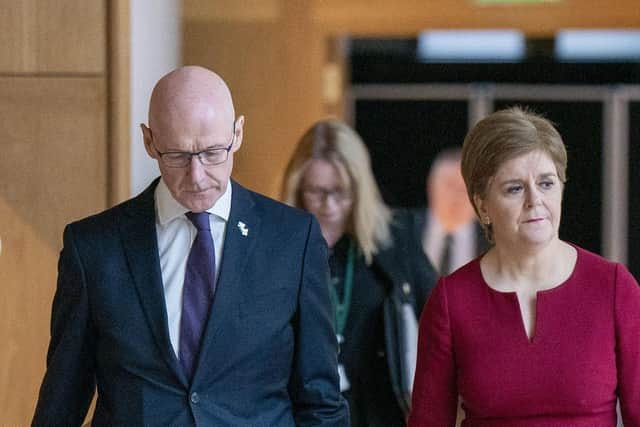Scottish Budget statement: Richest Scots face tax rises
Deputy First Minister John Swinney will reveal the Scottish Budget statement on Thursday amid steep inflation and an economic crisis, as well as pressure from unions threatening strike action unless public sector workers are paid in line with inflation.
Social Justice Secretary Shona Robison said yesterday the Scottish Government’s tax decisions will continue to follow a “progressive” model, adding “ those with the broader shoulders should pay more”.
Advertisement
Hide AdAdvertisement
Hide AdShe said the Scottish Government had put £3bn in place to help people with the cost of living over the last year.


“We have changed our tax system to be much more progressive than that throughout the rest of the United Kingdom.
“But we are doing that within a very limited fixed budget with limited tax powers and limited borrowing powers.”
Robison added: “We will set out our tax position on Thursday and it will follow the progressive taxation that we already have done to raise those extra resources – that those with the broader shoulders should pay more.
“Of course, we’ll continue to look at what more we can do around the taxation powers that we have.”
Scottish Conservative Shadow Cabinet Secretary for Finance and Economy, Liz Smith warned against targeting middle earners.
“Scotland already has the highest income tax rates in the UK and any widening of the tax differential would put us at an even greater competitive disadvantage.
“Those on the 41p rate are not by any means top earners – they are middle-income Scots who are already feeling the squeeze from the cost-of-living crisis.
Advertisement
Hide AdAdvertisement
Hide Ad“They should not be further punished by an SNP government which has ignored the priorities of working people and wasted hundreds of millions of pounds of taxpayers’ money on the likes of the ferries fiasco, BiFab, the malicious Rangers prosecution and Prestwick airport.”
Scottish Labour’s finance spokesperson Daniel Johnson said: “While I note these comments with interest, the SNP’s track record on taxation powers is poor. Despite calls from Labour in previous years, income tax powers have been used modestly and they have failed to even explore wider taxation powers.
“We need a budget that targets those in most need, that will require powers to be used creatively and to their fullest extent. These are warm words, we will see if they are reflected in the budget.”
Scottish Liberal Democrat economy spokesperson Willie Rennie said: “We need a tax deal that works. It is only right that those at the top of the tree pay their fair share, but that should not come at a cost of discouraging inward investment, resulting in moving money away from Scotland.
“Nicola Sturgeon’s government would also have more to spend if they stopped wasting £17m on the Thatcherite testing of primary ones and if they ditched their £20m pig-headed bid to break up the UK.
“This is a budget about choices and the Scottish Government need to make choices which work for all.”
Trade unions and Scottish think-tanks have been putting forward their own proposals ahead of Thursday’s budget announcement.
The Scottish Trades Union Congress (STUC) has put forward a series of tax proposals which it says will raise at least an additional £1.3bn a year for Scotland.
Advertisement
Hide AdAdvertisement
Hide AdSTUC general secretary Roz Foyer said ministers should be using their powers to start to “redistribute wealth through our economy to where it’s needed most”.
In a separate report, Strathclyde University’s Fraser of Allander Institute said the UK Government’s autumn statement, which will see Scotland receive an extra £1.5bn over 2023/24 and 2024/25, will more or less offset the inflationary impacts to the Scottish economy.
Professor Mairi Spowage, director of the Institute, said: “John Swinney is getting set to present his first budget in seven years, in what he acknowledged is an unprecedented tricky time for the Scottish public finances.
“The challenges he has been dealing with for 2022/23 ease a bit for 2023/24: there was some additional money announced at the autumn statement which generated around £1bn of consequentials, offsetting the inflationary pressures on the budget.
“But there is also flexibility that the Deputy First Minister has for the next financial year that were not available to him for this year – the Scottish Government does have tax powers that could be used, if he wishes, to raise more revenue.”
Emma Congreve, deputy director, said: “In amongst all the headline-grabbing decisions, it will be important to take a step back to see how this budget helps Scotland achieve its long-term ambitions.
“We are expecting that the Government will set out, clearly and transparently, the choices it has made and what the impact, both good and bad, will be for policy outcomes and the impacts on different groups.”
Responding to the institute’s report, Swinney said the Government had acted “decisively” to provide what support it could.
Advertisement
Hide AdAdvertisement
Hide AdSwinney said: “However, given the fiscal constraints of devolution, it is not possible to go as far as we would like and so the Budget will prioritise three areas – eradicating child poverty, transforming the economy to deliver net zero and creating sustainable public services.
“Difficult decisions are required and resources will be targeted where they are most needed and can secure maximum value from every pound spent.
“The economic challenges we face also require a fundamental change in the way we manage public spending.
“The Bank of England is predicting the longest recession for a century, so this Budget will set in motion reforms that will place our finances and public services on a more sustainable and resilient footing for the future.
“Proposals on tax policy for 2023-24 will also be published as part of the Budget.
“This is a time for firm leadership and bold decision-making. Steps we take now will help ensure Scotland emerges from the current crisis a stronger, fairer, greener country.”
Comments
Want to join the conversation? Please or to comment on this article.